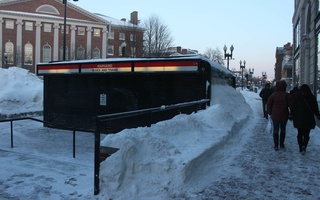The end of late-night weekend T service in March marked disappointment for many commuters in the greater Boston area. But fortunately, three transportation advocates have proposed a sensible plan for all-night, daily bus service to replace the discontinued subway service. The MBTA should work to implement this proposal by the summer. And as it does so, T administrators and state political leaders should consider more proactive solutions to the region’s transportation woes, rather than continually pursuing ideas in reaction to public pressure and fiscal crises.
The all-night bus service plan—the brain-child of transportation blogger and planner Ari Ofsevit, transportation advocate Jeremy Mandelson, and former Massachusetts Transportation Secretary James Aloisi—combines a cost-effective approach with the ambitious goal of “putting the bulk of the most densely populated parts of Boston and surrounding communities within a 20-minute walk of a bus stop.” Taking cues from existing routes and from successful early morning services to Logan Airport, the proposal calls for nightly buses that would reach key parts of Boston and Cambridge, as well as nine other cities and towns. A central pulse point like Copley Square, where all routes would converge hourly, would facilitate easy transfers between routes. Importantly, the plan would be far less expensive than the discontinued weekend service and would make “low-income areas and job access routes” the priority—precisely the places most in need of reliable overnight transit.
At a meeting last week, the MBTA’s board seemed to consider the proposal seriously. Though the board did not come to a final decision in that meeting, they should move to approve the proposal quickly so that it can take effect over the summer. The benefits of this plan, in allowing working people to commute to overnight jobs and helping to ensure that Boston’s mass transit system lives up to the city’s global status, are clear.
Beyond the immediate implementation of this proposal, the MBTA and leaders on Beacon Hill should use the continuing debate over late-night service as an opportunity to create a broader vision for the future of public transportation in the Greater Boston area. While recent conversations have focused on the necessity on cost-cutting, this concentration has rendered policy-making too reactive. Plans like the one currently under consideration contain within them the seeds of a more proactive transportation agenda for Boston. As Harvard economics professor Edward Glaeser has written, Boston’s mass transit system needs initiatives like “cooler buses,” not just new savings at the expense of riders.
The MBTA’s goal should be to provide a more comprehensive framework for the future of mass transit in Boston and the surrounding area, starting with a renewed commitment to overnight service. Ideally, this would include the eventual return of some extended train services in addition to the new bus proposal. As Mandelson, Ofsevit, and Aloisi wrote in explaining their plan, Boston’s lack of overnight service compares unfavorably with its urban peers. Beginning this summer, the T and state political leaders should ensure that the Hub starts catching up.
Read more in Opinion
My First TimeRecommended Articles
-
Free Transportation to ConcertThe University Musical Clubs will give a concert in Fitchburg at Wallace, Hall on Wednesday evening, March 1, at 8
-
Rebate on Railroad TicketsSince the Princeton trip committee has sold over 500 transportation tickets, the New Haven road has offered a rebate of
-
Transportation Startup Beta Tests in SquareFounded by Middlebury College alumnus Matthew George, Bridj is a smart transit system that uses data to produce flexible bus routes.
-
Fixing the MBTAThe Massachusetts Bay Transportation Authority (MBTA) appears set to cut late-night service. However, this is not the answer to its long-standing budget problems.
-
 MBTA Votes Unanimously to Cut Late Night Weekend Service
MBTA Votes Unanimously to Cut Late Night Weekend Service













